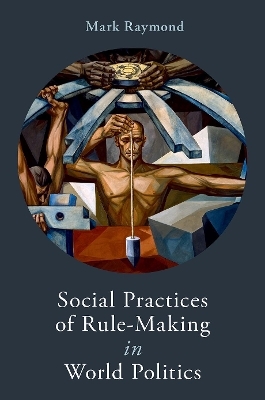
Social Practices of Rule-Making in World Politics
Oxford University Press Inc (Verlag)
978-0-19-091311-3 (ISBN)
Rule-based global order remains a central object of study in International Relations. Constructivists have identified a number of mechanisms by which actors accomplish both the continuous reproduction and transformation of the rules, institutions, and regimes that constitute their worlds. However, it is less clear how these mechanisms relate to each other--that is, the "rules for changing the rules". This book seeks to explain how political actors know which procedural rules to engage in a particular context, and how they know when to utilize one mechanism over another. It argues that actors in world politics are simultaneously engaged in an ongoing social practice of rule-making, interpretation, and application. By identifying and explaining the social practice of rule-making in the international system, this book clarifies why global norms change at particular moments and why particular attempts to change norms might succeed or fail at any given time. Mark Raymond looks at four cases: the social construction of great power management in the aftermath of the Napoleonic Wars; the creation of a rule against the use of force, except in cases of self-defense and collective security; contestation of the international system by al Qaeda in the period immediately following the 9/11 attacks; and United Nations efforts to establish norms for state conduct in the cyber domain. The book also shows that practices of global governance are centrally concerned with making, interpreting, and applying rules, and argues for placing global governance at the heart of the study of the international system and its dynamics. Finally, it demonstrates the utility of the book's approach for the study of global governance, the international system, and for emerging efforts to identify forms and sites of authority and hierarchy in world politics.
Mark Raymond is the Wick Cary Assistant Professor of International Security and Director of the Cyber Governance and Policy Center at the University of Oklahoma. He has been a Carnegie Fellow at the School of International and Public Affairs at Columbia University, an External Affiliate of the Ostrom Workshop at Indiana University, and a Fellow with the Center for Democracy and Technology.
Acknowledgments
Introduction
Chapter 1: Social Practices of Rule-Making
Chapter 2: The Social Construction of Great Power Management, 1815-1822
Chapter 3: Banning War: Social Practices of Rule-Making in the Interwar Period
Chapter 4: Social Practices of Rule-Making and the Global War on Terror
Chapter 5: Applying Old Rules to New Cases: International Law in the Cyber Domain
Conclusion
Notes
References
Index
| Erscheinungsdatum | 14.01.2019 |
|---|---|
| Verlagsort | New York |
| Sprache | englisch |
| Maße | 166 x 243 mm |
| Themenwelt | Sozialwissenschaften ► Politik / Verwaltung ► Europäische / Internationale Politik |
| Sozialwissenschaften ► Politik / Verwaltung ► Politische Theorie | |
| ISBN-10 | 0-19-091311-8 / 0190913118 |
| ISBN-13 | 978-0-19-091311-3 / 9780190913113 |
| Zustand | Neuware |
| Haben Sie eine Frage zum Produkt? |
aus dem Bereich


